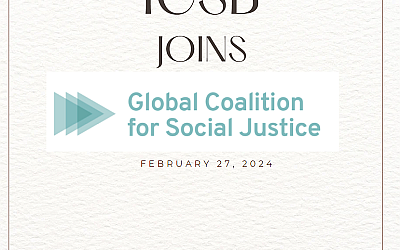Pioneering Entrepreneurship: Switzerland’s Path to a Better World
Switzerland’s journey as a beacon of innovation and competitiveness offers valuable insights and lessons for the world. Its success is rooted in visionary governance, entrepreneurial dynamism, and a steadfast commitment to education. As the world grapples with the complexities of the modern era, Switzerland’s resilience and leadership serve as a guiding light, reminding us of the power of embracing innovation, fostering global connectivity, and anchoring economic policies in equity and social justice principles.
SocialJustice
In a significant move towards bolstering global efforts for social justice, ICSB has officially joined The Global Coalition for Social Justice. This groundbreaking initiative aims to amplify collective endeavors in urgently addressing social justice deficits and accelerating the implementation of key global agendas, including the 2030 Agenda for Sustainable Development, the Sustainable Development Goals, and the Decent Work Agenda.
2024SMENumberOneTrend
The ICSB’s number one leading trend of 2024 in small businesses is the emergence of collaborative alliances, breathing new life into an age-old concept. This trend takes center stage, providing MSMEs with a transformative path forward for several compelling reasons. In an era riddled with economic uncertainties and disruptions, businesses recognize the undeniable power of unity, making Collaborative Alliances the top choice for fostering growth and resilience.
2023Farewell
As we say goodbye to 2023, let’s take a moment to look back at a year filled with both challenges and opportunities. The world faced new tensions, rising energy costs, and ongoing COVID-19 variants. Although the future remains uncertain, our guiding principles remain the same: adaptability, innovation, and sustainability.
NewSilkRoad
The transition from the Silk Road to the Entrepreneurship Road, as conceptualized by Dr. Ayman ElTarabishy, represents a significant shift in global trade and interaction. Moving beyond the ancient trade routes that connected diverse cultures, this new concept focuses on innovative and sustainable entrepreneurship. Dr. ElTarabishy’s vision encapsulates the modern era’s emphasis on technology, creativity, and inclusivity. It highlights the evolving nature of global commerce and cultural exchange in the 21st century.
SBHNov2023
In the newest issue of Small Business Horizon Magazine (SBH), we are excited to present a fascinating feature that intersects the evolution of technology with the timeless appeal of music. Artificial intelligence has now reached the realm of cultural nostalgia, reviving the music of The Beatles and John Lennon for the ears of a modern audience.
USATopSME2023
On October 19, 2023, the U.S. Chamber of Commerce held its first America’s Top Small Business gala to honor this year’s seven regional finalists, who were chosen from a pool of nearly 15,000 applicants, and also announced the grand prize winner, who took home the $25,000 cash prize! ICSB recognizes the U.S. Chamber initiative and congratulates all the finalists and winner.
WomeninGlobalMarkets
In 2023, ICSB emphasized empowering women in entrepreneurship with their theme for MSMEs Day, sparking crucial dialogues in the business realm. This notion has been significantly validated by Claudia Goldin’s Nobel Prize-winning research into gender disparities in the labor market. MSMEs, especially those helmed by women and youth, navigate a precarious journey through global instabilities and limited access to vital resources. Policies and infrastructures that nourish MSME development, particularly in women and youth-led initiatives, are pivotal in steering towards Sustainable Development Goals and forging a path to an inclusive, prosperous future.
SMEs and Climate Change
SMEs have the agility, community influence, and innovative spirit to make substantial strides in addressing climate change. Their actions, both big and small, contribute to a collective effort pushing us towards a more sustainable future. In the climate narrative, SMEs are not just supporting characters; they’re leading protagonists.
AI Punctuated Revolution
We’re handed a distinctive chance and profound duty at the intersection of biology, history, AI, and technology. We can orchestrate a global symphony of transformative change by merging rhythm, insight, and adaptability. With the right tools and a united chorus, our commitment to sustainability and inclusivity should echo into the future, ensuring AI benefits all.















